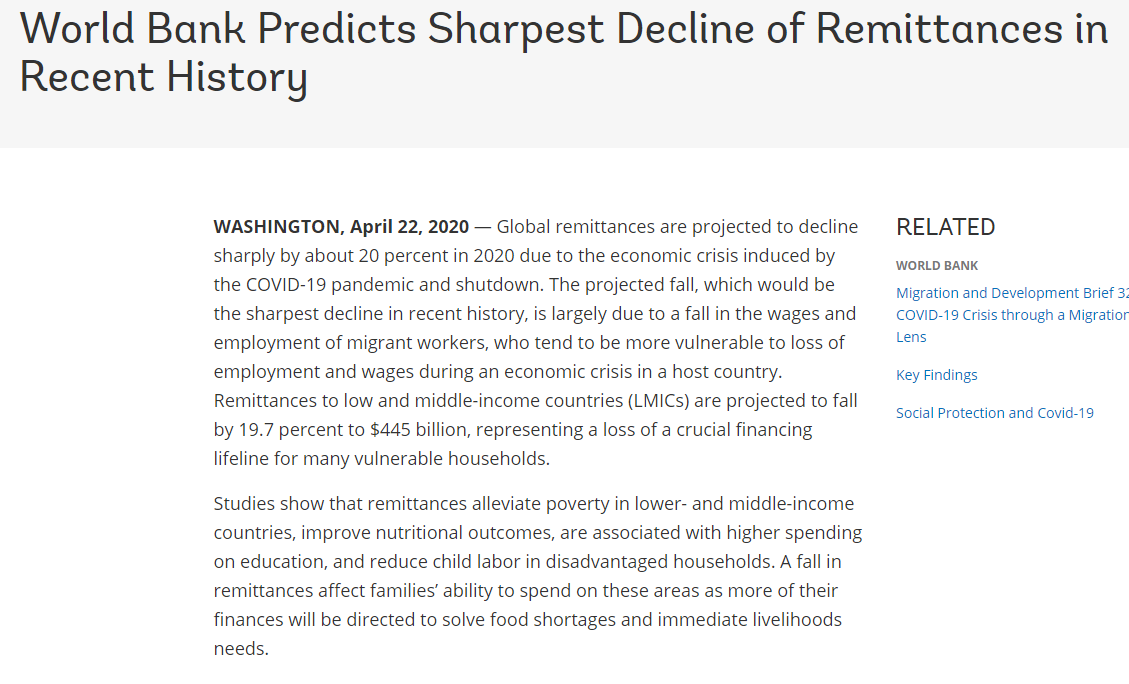
**Editor's Note: **Stephen Ndegwa is a Nairobi-based communications consultant and international affairs columnist. The article reflects the author's views, and not necessarily those of CGTN.
Out of the various reasons that many people in developing countries seek a better life overseas, money ranks at the top. Many college graduates unable to get decent jobs or means of livelihood at home fly out to rich countries to undertake menial jobs, simply because they can get paid handsomely.
There are millions of economic immigrants around the world, who collectively send billions of dollars back home each year. The money is usually used by siblings and other family members for their well-being.
High remuneration is the main motivation behind human capital flight to countries with superior economic prospects. But while some of the host countries are welcoming to the immigrants for their "brain gain" value, other nations view them as an added social and economic burden they can ill afford.
It is usually a predicament for the immigrants, having left a deeply unsatisfying life at home, to another hostile environment. However, this delicate balance can be disrupted by unprecedented national or global events, like what the world is currently undergoing under the COVID-19 pandemic.
According to a recent study by the World Bank, global remittances are projected to decline by a whopping 20 percent this year, the sharpest drop in recent history, as a result of the economic crisis from the novel coronavirus. The widespread economic shutdown has hurt the wages and employment prospect of millions of migrant workers the world over.
The study shows remittances to low and middle-income countries (LMICs) are projected to drop by 19.7 percent to 445 billion U.S. dollars, from a record 554 billion U.S. dollars in 2019. Remittances during the latter year exceeded monies from foreign direct investment.
The World Bank report shows substantial drops in remittances across all major World Bank Group regions: Europe and Central Asia (27.5 percent), sub-Saharan Africa (23.1 percent), South Asia (22.1 percent), the Middle East and North Africa (19.6 percent), Latin America and the Caribbean (19.3 percent), East Asia and the Pacific (13 percent).

A screenshot of the World Bank report
For instance, in sub-Saharan Africa, COVID-19 is expected to lead to a decline of remittances from 48 billion U.S. dollars in 2019, to 37 billion U.S. dollars in 2020. This will definitely impact the economies of these countries negatively. The report attributed this scenario to the fact that African migrants work in the European Union, the U.S., Middle East and China, which comprise the major economies hardest hit by the pandemic.
The U.S. is a perfect case study of how remittances will be affected from the short to medium term. Out of the estimated 20 million workers who have so far registered for unemployment benefits in America after their jobs were wiped out by COVID-19, a large percentage are immigrants.
The situation has been aggravated by President Donald Trump's announcement in mid-April that he will sign an executive order to temporarily suspend all immigration to the U.S. because of COVID-19, as a way of protecting American jobs. Consequently, millions of people in LMICs will lose a crucial financial lifeline.
But the World Bank warns that things should not be allowed to deteriorate irreparably. In the report, the Bank's Global Director of Social Protection and Jobs Global Practice, Michal Rutkowski, states, "effective social protection systems are crucial to safeguarding the poor and vulnerable during this crisis in both developing countries as well as advanced countries. In host countries, social protection interventions should also support migrant populations."
The World Bank predicts some reasonable recovery of the currently dwindling levels of remittances in 2021 as the pandemic is hopefully contained. However, this depends on two things. First, that there will be no second COVID-19 wave, which is a reality that is widely feared. The world is not ready for another lockdown.
Secondly, many jobs are simply not coming back, either by design, or by default. Some jobs will become obsolete, as new technologies emerge to replace an incapacitated or immobilized labor force, like is now happening.
This is the scenario that awaits the Global Forum on Remittances, Investment and Development (GFRID), which will be hosted by the United Nations in Nairobi, Kenya from October 5-7, 2020. The three-day forum aims at exploring opportunities and challenges in Africa's remittance market, and the development potential of these flows in the destination countries.
Participants of the GFRID will also explore the role of innovation and technology in enabling easier and cheaper money transfers, and in entrenching financial inclusion in communities that receive the remittances.
It is expected that deliberations will also seek ways of filling in the gaps created by the shortfalls arising from the economic devastation of COVID-19 on both ends of the economic divide.
Further, there is a bigger conversation that needs to be had on monitoring the flow of remittances through various money transfer channels, the costs and convenience of sending money, and regulations to protect financial integrity in the remittances ecosystem.
(If you want to contribute and have specific expertise, please contact us at [email protected])
 简体中文
简体中文





